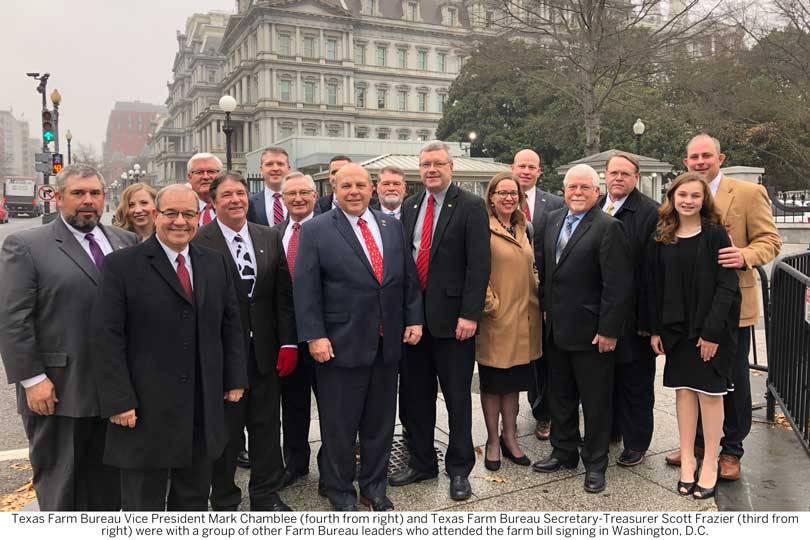By Jessica Domel
Multimedia Reporter
After a handful of listening sessions, hundreds of comments and weeks of negotiations, the 2018 Farm Bill was officially signed into law today.
Texas Farm Bureau (TFB) Vice President Mark Chamblee of Smith County and Secretary-Treasurer Scott Frazier of Nueces County attended the signing ceremony at the White House–continuing the integral role Texans and those involved in agriculture played in the crafting of the bill.
While farmers and ranchers may not have had a direct hand in ironing out the details of the farm, nutrition and conservation legislation, their questions, concerns and stories helped guide the farm bill conference committee’s work, according to U.S. Congressman Mike Conaway of Texas.
“Well over 1,000 people came before our groups (at the listening sessions) and poured their hearts out as to why this farm bill’s important, what it does for them, what it doesn’t do for them and those kind of things,” Conaway, chair of the House Committee on Agriculture, told the Texas Farm Bureau (TFB) Radio Network. “It was important. It was good to have that passion and have that emotion you saw there as a motivating factor to say, ‘I’ve got to get this done.’”
For the first time since 1990, a farm bill was passed in the same year the legislation was written.
“Crafting a bill of this magnitude and importance isn’t an easy task. We truly appreciate the hundreds of hours the farm bill conference committee, ag committees and their staff put in to ensure the nation’s farmers and ranchers have the safety net they need to continue feeding and clothing the world,” TFB President Russell Boening said.
Crafting the farm bill wasn’t easy, Conaway said, but the needs of farmers and ranchers are greater that they have been in a long time due to an uncertain farm economy and several years of decline in net farm income.
“Our nation’s farmers and ranchers are the very best in the world, but they cannot compete alone against a sea of high and rising foreign subsidies, tariffs and non-tariff trade barriers,” Conaway, one of the “Big Four” negotiators for the deal, said. “Nor can they survive alone in the face of record droughts, hurricanes, wildfires and other natural disasters. That’s why we have a farm bill.”
The number one request most farmers had while talking to Conaway was to “do no harm” to federal crop insurance.
The 2018 Farm Bill honors that request.
“Food security is national security and depends on strong agricultural policy that provides certainty and stability for the 3.75 million Texans employed by the agriculture sector,” U.S. Congressman Will Hurd of Texas said. “I am proud to support the farm bill and will continue to fight for the hardworking men and women who put clothes on our backs and food on our tables.”
The legislation strengthens the farm safety net by allowing farmers to choose between Agriculture Risk Coverage (ARC) or Price Loss Coverage (PLC) on a year-by-year, crop-by-crop basis beginning in 2021.
The decision made in 2019 will be used for both 2019 and 2020.
There will be a nationwide yield update for PLC beginning with the 2020 crop year. Improvements to ARC include increased yield plugs and yield trend adjustments.
“This legislation includes critical changes that allow farmers to have more control over the safety net that provides a helping hand—not a hand out—when times get tough,” Boening said.
Individual Farm Service Agency loan limits are increased in the farm bill for the first time in 16 years.
“We strengthened key conservation initiatives, especially the Environmental Quality Incentives Program,” Conaway said. “These highly-successful conservation initiatives serves as a prime example of how voluntary, incentive-based conservation beats burdensome, arbitrary and costly Washington regulations every time.”
To enhance agricultural trade, the farm bill streamlines market promotion initiatives under one umbrella. An additional $470 million is allocated to those trade promotion initiatives.
“We increased agricultural research funding at a time when we are dangerously lagging behind China. We provided Secretary (Sonny) Perdue with the tools he requested to effectively combat the opioid epidemic and also to expand high-quality broadband service to all of rural America,” Conaway

